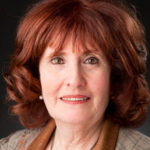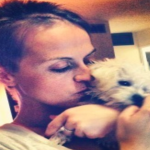Face to Face
December 20, 2013
By: Julie Lévesque
Marie, my only child, will soon be four years old. Aside from our trips to and from daycare and her grandparents’ house, and an occasional family road trip, we have never travelled any long distance together. After getting results from a PET scan that meant more chemotherapy in my near future, I decided to leave with her. Alone. Her and me. Close to ten hours on the road with a stop half-way, only to fill up on gas and to sleep. She was all excited at the idea of finally going to visit her cousin who lives “far far far away”. All I thought about was that this first mother and daughter trip we would take since her birth might be the last. (It’s the same thing when I go see my hairdresser: when he tells me he’ll see me next time, I tell myself that there may not be a next time… unless he’s able to handle the hair clipper without crying.)
What’s particular is the closeness and the strangeness of our relationship, of our conversations. Marie still does not know that I will need more chemo in a few weeks, but she senses it. Or at least I believe she does.
Stop at Ikea. Between two aisles of kitchen utensils and cups and glasses, while I am looking at and questioning the usefulness of who knows what object, Marie, sitting comfortably at the end of the shopping cart, says to me: “I miss Réjeanne.”
Réjeanne is my fiancé’s aunt; Marie’s great-aunt. But she was also a grand-mother to Marie, as we liked to tell her. Réjeanne and I received our cancer diagnoses within one week of each other, in 2010: mine was of the breast, and hers the colon. We saw each other often, probably more than we would have had it not been for our respective experiences with cancer. We were close, she loved to take care of my daughter, to spoil her as though she was her granddaughter. We both finished our treatments, and life continued. More time would go by between visits. When she told me in the winter of 2012 that her cancer had metastasized, her life expectancy was only a few months. Her state deteriorated rapidly. The last time I saw her, I was with Marie. It was at the hospice for palliative care. Since it was so close to home, we walked there. There weren’t any slippers small enough for my daughter at the entrance. That really got to me. Children don’t have to deal with death?
Réjeanne told me not to worry, that the cancer wouldn’t come back in my case. I dared to hope that the dying were always right. Quiet, but happy to see her great-aunt, my daughter walked throughout the room, observing, as she usually does. She was two-and-a-half. Réjeanne died a few days later. The months went by. One day, as we were coming home from daycare, Marie asked me quite simply whether Réjeanne was still wearing her pajamas.
So I was not surprised to be questioned so openly in the middle of a crowded Ikea on a beautiful Sunday afternoon.
– Are her eyes open?
– No, her eyes are closed.
– Does she have a bracelet like old Thomas does?
– What do you mean, bracelet? Ummm, no, I don’t think she had one.
– Where is Réjeanne?
– She’s buried in the cemetery, in the village where grandma lives. I can show you the next time we visit. In the meantime, if we want to remember Réjeanne, we can look at photos. When we go to stay at aunt Julie’s house tonight we can ask to see some… Aunt Julie is Réjeanne’s daughter, so she has a lot of them.
– Okay.
This conversation does not take place in the privacy of a living room. We’re under the fluorescent lights of a department store, with strangers pushing past us with their shopping carts, while ours remains quite still.
– Yes, this is indeed the department where we speak to our young children about death. Yes, I think about my mortality almost every day.
That’s what I wanted to tell all the ears that eavesdropped parts of our conversation.
I answered my daughter’s down-to-earth questions about Réjeanne’s death with poise. And then, I began to think about what I could tell her when the time came to talk about my own death. Just imagining having to explain that mommy would have to have more very strong medicine in her veins caused chaos in my mind. I keep putting it off.
When I was initially diagnosed, Marie was just a baby, only a few months old. I remember having cried when I said to her that mommy was very sick and that I had to stop breastfeeding immediately, while she drank from her bottle like it was nothing, as though she had already taken in and adjusted to this new reality. That same evening, she refused to drink from the breast. They say that children are resilient; and I am absolutely convinced that it is true.
Last year, when I learned that the cancer had metastasized and that I had to have chemo once again, my daughter was 3 years old. I explained to her simply that: “Mommy has a number of bumps in her neck, and I’m going to get very strong medicine at the hospital to make them go away. I will be tired and nauseous. I will rest often. But don’t worry.” And then I listed all the important people in her life who would take very good care of her.
This time, she is 4-years-old. You can’t tell a 4-year-old child just anything. Especially since this little lady has some record-setting questions: it’s like the face-to-face Olympics… Whether it comes to mother/daughter stuff, cancer/death stuff, or chocolate-dessert-can-I-have-another-big-piece-please-please! I would rather not have to talk to her about illness, but instead about princesses and cotton candy. But wearing pink-colored glasses and telling beautiful stories that always have happy endings is out of the question. No. Metastatic breast cancer is incurable and we do not live in a fairy tale.
I am no longer looking to make sense out of all of this, because there is no sense to it. I will have to face it all, once again. In this daily face-to-face between life and death.
Throughout my treatments this winter, I will think about all that my life will not be and all that it is: extraordinary. As in: outside of the ordinary.
Note: We had just started the trip back home when Marie said to me: “Mommy… we forgot something. We forgot to look at photos of Réjeanne.”
Face to Face is Julie Lévesque’s first publication about illness. She discusses her relationship with her four-year-old daughter.
*****
The triple negative breast cancer diagnosis arrived in my life as I was breastfeeding my first baby, then only a few months old. It was the spring of 2010, I was 31 and still had just enough naiveté to throw myself head first into what would become nine months of treatment – an experience that was outside of anything normal and that would affect the rest of my life. The classic story. In the autumn of 2012, I became the bearer of the news that any woman having faced breast cancer fears: metastatic breast cancer. Now I am learning to live with it. Because it is part of my life.
I live in Rimouski (Québec, Canada) with my fiancé and the beautiful Marie.
www.twitter.com/etre_julie





